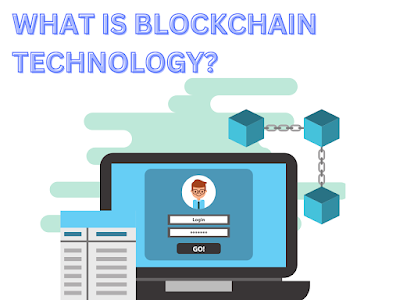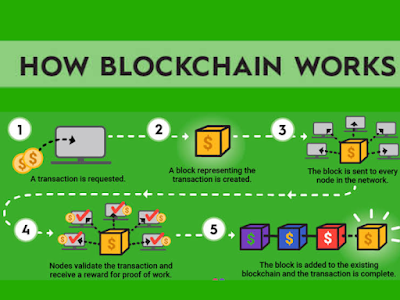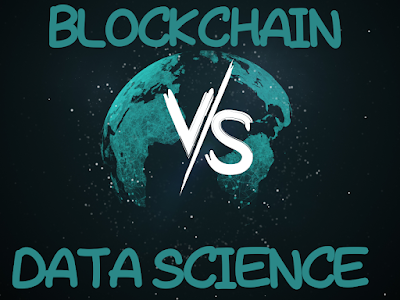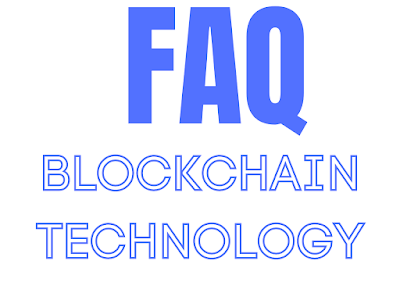Blockchain technology has been making waves in recent years, with many experts hailing it as the future of the internet. At its core, Blockchain technology is a decentralized, digital ledger that allows for secure, transparent and tamper-proof transactions. The technology has far-reaching implications across a wide range of industries, from finance and banking to healthcare and supply chain management. Blockchain development, Cryptocurrency, Bitcoin, Ethereum, Blockchain technology explained, Blockchain technology for beginners,
BLOCKCHAIN TECHNOLOGY
In this article, we'll explore the basics of Blockchain technology and its many applications. We'll look at the advantages and disadvantages of using Blockchain technology, and examine how it's changing the way businesses operate. We'll also delve into the various use cases of Blockchain technology, from banking and finance to healthcare and logistics. Blockchain technology use cases, Blockchain technology in banking, Blockchain technology in healthcare,
Whether you're a seasoned Blockchain expert or just starting to learn about the technology, this article is for you. We'll provide a comprehensive overview of Blockchain technology, including its history, key concepts, and potential for the future. So, let's dive into the world of Blockchain technology and explore what makes it such a transformative force in the world of technology and business.
Here my friends we start with what is Blockchain technology with Examples? Ok
Enjoy the Article friends don't forget to read the FAQ section. In FAQ section we talk about lots of things abot Blockchain so don't miss the End because the real Organic Juice is that Section. Ok Blockchain technology in supply chain management, Blockchain technology advantages and disadvantages, Blockchain technology trends,
What is Blockchain technology?
Blockchain technology is a digital ledger technology that allows data to be stored in a decentralized, secure, and transparent manner. A blockchain is a type of database that stores data in "blocks" that are linked together chronologically, forming a "chain" of blocks. Each block contains a unique code called a "hash" that represents the data in that block. Once a block is added to the chain, it cannot be altered or deleted.
One of the main advantages of Blockchain technology is that it is decentralized, meaning that there is no need for a central authority or intermediary to manage the system. Instead, all users on the network have a copy of the blockchain, and every transaction is verified by a network of nodes before it is added to the chain. This makes Blockchain technology highly secure, as it is very difficult for hackers to tamper with the data or hack the system.
Another advantage of Blockchain technology is that it is transparent, meaning that every user on the network can see all of the transactions that have been made. This helps to prevent fraud and ensures that transactions are fair and accurate. Additionally, Blockchain technology is highly versatile, and can be used in a wide range of industries, from finance and banking to healthcare, supply chain management, and more.
Overall, Blockchain technology is a powerful tool that has the potential to revolutionize the way we store and manage data. Its decentralized, secure, and transparent nature make it an attractive option for businesses and individuals alike.
Blockchain Examples:
Here are some examples of Blockchain technology and how is being used in various industries:
Banking and finance: Many financial institutions are exploring the use of Blockchain technology to improve the efficiency and security of financial transactions. For example, JPMorgan has developed its own Blockchain platform called Quorum to enable secure and transparent financial transactions.
Healthcare: Blockchain technology is being used to improve the security and privacy of medical records. One example is MedRec, a Blockchain-based platform that allows patients to securely store and share their medical records with healthcare providers.
Supply chain management: Blockchain technology is being used to improve supply chain transparency and traceability. For example, Walmart is using Blockchain technology to track the origin of food products and ensure food safety.
Real estate: Blockchain technology is being used to simplify and speed up real estate transactions. For example, Propy is a Blockchain-based platform that allows users to buy and sell real estate properties using digital currencies.
Gaming: Blockchain technology is being used to create new and innovative gaming experiences. For example, the Blockchain-based game CryptoKitties allows players to buy, sell, and breed digital cats using Ethereum.
These are just a few examples of how Blockchain technology is being used in various industries. As the technology continues to evolve, we can expect to see even more exciting and innovative applications of Blockchain in the future.
Who Invented Blockchain?
Blockchain technology was first introduced in 2008 by an anonymous person or group of people who used the pseudonym "Satoshi Nakamoto." The identity of Satoshi Nakamoto is still unknown, and it's possible that this name represents a group of individuals rather than a single person.
Satoshi Nakamoto's invention of the Blockchain was a critical component of the first-ever cryptocurrency, Bitcoin. The Blockchain was used as a decentralized ledger to record all Bitcoin transactions, ensuring that they were transparent, secure, and tamper-proof. Since then, the Blockchain has become a foundational technology for a wide range of applications beyond cryptocurrency, including supply chain management, voting systems, and more.
Why Blockchain is Important?
Blockchain technology is important for several reasons:
Decentralization: Blockchain technology enables the creation of decentralized networks, which operate without the need for a central authority or intermediary. This decentralization makes Blockchain highly secure and resistant to hacking or fraud.
Transparency: The transparent nature of Blockchain technology makes it possible to track and verify transactions, providing a level of transparency that was previously impossible. This has made it a popular tool for a wide range of applications, from financial transactions to supply chain management and voting systems.
Security: The cryptographic techniques used in Blockchain technology make it highly secure and resistant to tampering. Once data is recorded on the Blockchain, it cannot be altered or deleted without the consensus of the network.
Efficiency: Blockchain technology can help to streamline processes and reduce costs by eliminating the need for intermediaries and enabling faster, more secure transactions.
Trust: The decentralized, transparent, and secure nature of Blockchain technology has made it possible to create trust in a digital environment, which is essential for a wide range of applications, from financial transactions to healthcare and more.
Overall, Blockchain technology has the potential to revolutionize a wide range of industries by enabling new forms of collaboration, trust, and transparency. It has the potential to improve the efficiency and security of systems and processes, and to unlock new forms of value that were previously impossible.
How Blockchain Technology works?
Blockchain technology works by using a decentralized network of computers to maintain a digital ledger of transactions that is secure, transparent, and tamper-proof. Here's a simplified explanation of how it works:
Transactions: When a user initiates a transaction, it is broadcast to a network of computers called nodes. Each transaction is verified by multiple nodes before it is added to the Blockchain.
Blocks: Transactions are grouped together into blocks, which are added to the Blockchain in a chronological order. Each block contains a unique code called a "hash," which represents the data in that block.
Nodes: The Blockchain is maintained by a network of nodes, which work together to verify and process transactions. These nodes are responsible for ensuring that the Blockchain is secure and accurate.
Consensus: To ensure that all nodes on the network agree on the state of the Blockchain, a consensus mechanism is used. There are various consensus mechanisms, but the most commonly used one is called "Proof of Work," which requires nodes to solve a complex mathematical puzzle in order to add a block to the chain.
Security: Once a block is added to the Blockchain, it cannot be altered or deleted. This makes the Blockchain highly secure and tamper-proof.
Overall, the decentralized, secure, and transparent nature of the Blockchain makes it a powerful tool for a wide range of applications, from financial transactions to supply chain management, healthcare, and more.
What are the Types of Blockchain?
There are three main types of Blockchain:
Public Blockchain: A public Blockchain is a decentralized Blockchain network that is open to everyone. Anyone can participate in the network, read and write to the Blockchain, and access all the data stored on it. Bitcoin and Ethereum are examples of public Blockchains.
Private Blockchain: A private Blockchain is a decentralized network that is restricted to a specific group of users. In a private Blockchain, the nodes are operated by trusted parties, and the data is only visible to those who are authorized to access it. Private Blockchains are often used in businesses to share information within an organization or with partners.
Hybrid Blockchain: A hybrid Blockchain is a combination of a public and a private Blockchain. In a hybrid Blockchain, some data is stored on a public Blockchain, while other data is stored on a private Blockchain. This allows for the benefits of both types of Blockchains: the transparency and security of a public Blockchain, and the privacy and control of a private Blockchain.
Here we start knowing more in depth about Blockchain technology by the advantages, disadvantages, benifits etc.
Now here is it,
What are the Advantages and Disadvantages of Blockchain technology?
Advantages of Blockchain:
There are several advantages of Blockchain technology:
Decentralization: One of the most significant advantages of Blockchain technology is its decentralized nature. This means that there is no central authority or intermediary controlling the network. Instead, all transactions are verified and processed by a network of users, making it highly secure and resistant to hacking or fraud.
Transparency: Another advantage of Blockchain technology is its transparency. All transactions on the Blockchain are recorded in a public ledger, which can be accessed and viewed by anyone. This transparency helps to build trust and confidence in the system, and can also help to prevent fraud and corruption.
Security: The cryptographic techniques used in Blockchain technology make it highly secure and resistant to tampering. Once data is recorded on the Blockchain, it cannot be altered or deleted without the consensus of the network, making it highly reliable and trustworthy.
Efficiency: Blockchain technology can help to streamline processes and reduce costs by eliminating the need for intermediaries and enabling faster, more secure transactions. This can be particularly beneficial in industries such as finance, supply chain management, and healthcare.
Traceability: Because all transactions on the Blockchain are recorded in a public ledger, it is possible to track the movement of goods or assets throughout the entire supply chain. This can help to prevent fraud and counterfeiting, and can also help to ensure the authenticity and quality of products.
Overall, Blockchain technology has the potential to revolutionize a wide range of industries by enabling new forms of collaboration, trust, and transparency. It has the potential to improve the efficiency and security of systems and processes, and to unlock new forms of value that were previously impossible.
Disadvantages of Blockchain technology:
While Blockchain technology offers several advantages, there are also some potential disadvantages that should be considered. Here are a few of the most significant:
Scalability: One of the main challenges with Blockchain technology is scalability. As the number of users and transactions on the network grows, the time and computational power required to validate transactions can become a significant bottleneck. This can limit the speed and efficiency of the network and make it difficult to scale to support large-scale applications.
Energy consumption: Another potential disadvantage of Blockchain technology is the significant energy consumption required to validate transactions. Because Blockchain networks use a proof-of-work consensus algorithm to validate transactions, this requires a significant amount of computational power, which can be energy-intensive and environmentally costly.
Complexity: Blockchain technology can be highly complex and difficult to understand, which can create a barrier to adoption and implementation. This can also make it difficult to identify and address issues or bugs in the system.
Regulatory challenges: Because Blockchain technology is decentralized and operates outside of traditional regulatory frameworks, there can be regulatory challenges related to issues such as taxation, data privacy, and security.
Immutability: While immutability is a key advantage of Blockchain technology, it can also be a disadvantage in certain situations. If data is recorded incorrectly or fraudulently on the Blockchain, it can be difficult or impossible to correct or remove it.
Overall, while Blockchain technology offers many potential benefits, it is not without its challenges and potential drawbacks. It is important to consider both the advantages and disadvantages of the technology when evaluating its potential applications.
Read : Our Most Viewed and Loved Articles
The Future is Here: Understanding Artificial Intelligence and its Impact on Society
Quantum Computing IBM: Exploring the Future of Computing Technology
What is applications in Blockchain?
In simple words.
Blockchain technology has many different applications, but at its core, it is a secure, decentralized way to store and transfer data. This has a wide range of potential applications in various industries, such as:
- Cryptocurrencies
- Supply chain management
- Identity verification
- Voting systems
- Smart contracts
- Healthcare
- Real estate
- Gaming
These are just a few examples of the many applications of Blockchain technology. As the technology continues to evolve and mature, new and innovative use cases will likely continue to emerge.
Here we explore more about applications of Blockchain technology.
What are the applications of Blockchain technology?
Blockchain technology has a wide range of applications across various industries. Some of the major applications of Blockchain technology are:
Financial services: Blockchain technology can be used to create secure, decentralized systems for financial transactions, including payments, lending, and asset management.
Supply chain management: Blockchain technology can be used to create more efficient and secure supply chain systems by enabling real-time tracking and verification of goods and assets.
Healthcare: Blockchain technology can be used to create secure, decentralized systems for storing and sharing healthcare data, improving patient privacy and data security.
Identity management: Blockchain technology can be used to create secure, decentralized systems for identity management, enabling more secure and reliable identity verification processes.
Voting systems: Blockchain technology can be used to create more secure and transparent voting systems, helping to prevent fraud and ensure the integrity of the voting process.
Real Estate: Blockchain technology can be used to create secure, transparent systems for real estate transactions, including property sales and leasing.
Intellectual property: Blockchain technology can be used to create more secure and transparent systems for protecting and managing intellectual property, including patents, trademarks, and copyrights.
These are just a few examples of the many applications of Blockchain technology. As the technology continues to evolve, we are likely to see even more innovative and exciting use cases emerge across various industries.
What are the latest trends in Blockchain technology?
Blockchain technology is constantly evolving, and there are many exciting new trends and developments that are shaping the future of the industry. Here are a few of the latest trends in Blockchain technology:
Decentralized Finance (DeFi): Decentralized Finance is an area of Blockchain technology that focuses on creating decentralized financial systems that operate outside of traditional financial institutions. DeFi applications include cryptocurrency exchanges, lending and borrowing platforms, and prediction markets.
Non-Fungible Tokens (NFTs): Non-Fungible Tokens are a type of digital asset that are unique and not interchangeable, making them ideal for use cases such as digital art, collectibles, and gaming assets.
Central Bank Digital Currencies (CBDCs): Many central banks around the world are exploring the potential use of Blockchain technology to create digital versions of their fiat currencies. CBDCs could enable faster and more efficient payment systems and provide greater financial inclusion for underbanked populations.
Interoperability: Interoperability refers to the ability of different Blockchain networks to communicate and exchange data with one another. As the number of Blockchain networks continues to grow, interoperability will become increasingly important to enable seamless data exchange and collaboration.
Green Blockchain: Green Blockchain refers to efforts to make Blockchain technology more environmentally sustainable by reducing energy consumption and carbon emissions. This includes the development of more energy-efficient consensus algorithms and the use of renewable energy sources to power Blockchain networks.
These are just a few of the latest trends in Blockchain technology. As the technology continues to evolve, we are likely to see many more exciting developments and use cases emerge.
What are some examples of successful implementations of Blockchain technology?
Blockchain technology has been implemented in various industries with great success. Here are some examples of successful implementations of Blockchain technology:
Cryptocurrencies: Cryptocurrencies such as Bitcoin, Ethereum, and Litecoin are some of the most well-known and widely used applications of Blockchain technology. They allow for secure and decentralized peer-to-peer transactions without the need for intermediaries such as banks or financial institutions.
Supply chain management: Blockchain technology has been implemented in supply chain management to track and verify the authenticity of products as they move through the supply chain. Walmart, for example, uses Blockchain technology to track the origin and movement of food products, ensuring their safety and authenticity.
Healthcare: Blockchain technology has been used in the healthcare industry to securely store and share patient data between healthcare providers. This helps to prevent medical errors and ensure that patients receive the most appropriate treatment.
Voting: Blockchain technology has been proposed as a solution for secure and transparent voting systems. It can help to prevent voter fraud and ensure the accuracy of election results.
Real estate: Blockchain technology has been used in the real estate industry to streamline the process of buying and selling property. It allows for secure and transparent transfer of property ownership without the need for intermediaries such as title companies or real estate agents.
These are just a few examples of successful implementations of Blockchain technology. As the technology continues to evolve and mature, we are likely to see many more exciting and innovative use cases emerge.
What are the potential risks of Blockchain technology?
While Blockchain technology has numerous advantages and potential benefits, there are also some potential risks and challenges associated with its use. Here are some of the potential risks of Blockchain technology:
Security risks: Although Blockchain is known for its security, it is still vulnerable to certain types of attacks, such as 51% attacks or double-spending attacks. Additionally, if private keys are lost or stolen, the associated digital assets can also be lost or stolen permanently.
Regulation: The regulatory landscape for Blockchain technology is still evolving, and it is possible that governments may introduce regulations that could limit or constrain the use of Blockchain technology.
Scalability: Blockchain technology is still in the early stages of development, and some Blockchain systems may not be able to handle large volumes of transactions or scale effectively.
Interoperability: There are many different Blockchain platforms and protocols, and they are not necessarily interoperable with one another. This can make it difficult to build complex Blockchain applications that integrate with different systems and networks.
Energy consumption: Blockchain technology requires significant computing power, and some Blockchain systems use a significant amount of energy to operate. This has raised concerns about the environmental impact of Blockchain technology.
It is important to note that many of these risks are not unique to Blockchain technology, and they apply to other technologies as well. As Blockchain technology continues to evolve and mature, it is likely that solutions will be developed to address many of these potential risks and challenges.
Read : Our Most Viewed and Loved Articles
Unleash the Power of OpenAI's ChatGPT: The Future of Conversational AI
Quantum Computing: Revolutionizing the Way We Process Information
What is the difference between Blockchain and Bitcoin?
Blockchain and Bitcoin are two related but distinct concepts. Bitcoin is a cryptocurrency, which is a digital asset designed to work as a medium of exchange that uses cryptography to secure financial transactions, control the creation of additional units, and verify the transfer of assets. Bitcoin uses blockchain technology to maintain a secure and decentralized ledger of transactions.
On the other hand, blockchain is a decentralized and distributed ledger technology that enables the secure transfer and storage of data without the need for intermediaries. Blockchain is not limited to financial transactions, but it can be used to store and transfer any kind of data or digital asset.
In other words, blockchain is the underlying technology that powers Bitcoin, but it can also be used in many other applications beyond cryptocurrencies. While Bitcoin uses blockchain technology to enable secure transactions, blockchain technology can be used in a wide range of industries and applications, such as supply chain management, healthcare, identity verification, and more.
Blockchain vs Data Science
Blockchain and data science are two distinct fields with different applications, although they do have some overlap in certain areas.
Blockchain technology is a distributed ledger technology that enables secure and transparent transactions without the need for intermediaries. The main focus of blockchain technology is on establishing trust and security in transactions, as well as enabling decentralized systems.
On the other hand, data science is a field that involves extracting insights and knowledge from data, using statistical and machine learning techniques. The main focus of data science is on analyzing and interpreting data, with the goal of using this knowledge to make better decisions.
While the two fields have different applications, there are some areas where they intersect. For example, blockchain technology can be used to store and manage large amounts of data, and data scientists can use this data to gain insights and make predictions. Additionally, some blockchain applications involve using data analytics to analyze transaction data and identify patterns.
Overall, while there is some overlap between blockchain technology and data science, they are fundamentally different fields with different goals and applications.
Blockchain and Cryptocurrency
Blockchain and cryptocurrency are related concepts, but they are not the same thing.
Blockchain is a technology that enables secure and transparent transactions without the need for intermediaries. It is a distributed ledger that records transactions in a way that is immutable and transparent. The key features of blockchain technology include decentralization, immutability, transparency, and security.
Cryptocurrency, on the other hand, is a digital asset that uses cryptography to secure and verify transactions, and to control the creation of new units. Cryptocurrencies are often based on blockchain technology, which enables the secure and transparent transfer of these digital assets without the need for intermediaries.
One of the most well-known examples of a cryptocurrency is Bitcoin, which was created in 2009 and is based on blockchain technology. Bitcoin enables users to transfer value without the need for a central authority or intermediary, and transactions are recorded on a public blockchain ledger.
While blockchain technology and cryptocurrency are related, they are not interchangeable terms. Blockchain technology has a wide range of applications beyond cryptocurrency, including supply chain management, healthcare, and real estate. Cryptocurrency is just one application of blockchain technology, and there are many other potential uses for this innovative technology.
Blockchain without Cryptocurrency
Blockchain technology can be implemented without the use of cryptocurrency. While cryptocurrency was the first use case of blockchain technology, it is just one of many potential applications. Blockchain technology can be used for various purposes such as supply chain management, identity verification, digital voting, and more. In fact, many organizations and governments are exploring the use of blockchain technology for various purposes beyond just cryptocurrency. For example, Walmart is using blockchain technology to track food supply chains to increase efficiency and reduce waste.
Read : Our Most Viewed and Loved Articles
Maximize Customer Satisfaction with Chatbot Integration: A Comprehensive Guide
Maximize Your Reach on Social Media: A Guide to the Top AI Hashtag Generator
The Ultimate Guide to Chatbots: Revolutionizing Customer Service
FAQ - Blockchain Technology
What is the main purpose of Blockchain?
The main purpose of blockchain technology is to create a secure, decentralized, and transparent system for recording and transferring data. The technology enables data to be stored in a tamper-evident and immutable ledger that is maintained by a network of computers, rather than a centralized authority. This makes it virtually impossible to manipulate or hack the data, as it would require compromising the entire network. The aim of blockchain is to provide a more efficient, secure, and trustworthy way of recording and exchanging information, without the need for intermediaries or trusted third parties. This has applications in a wide range of industries and use cases, from finance and supply chain management to healthcare and voting systems.
What is Blockchain Platform?
A blockchain platform is a software framework that provides the tools and infrastructure needed to build, deploy, and operate blockchain applications. A blockchain platform typically includes a set of APIs, protocols, and libraries that developers can use to create decentralized applications (dApps) that run on top of the blockchain network.
A blockchain platform can be thought of as the foundation on which blockchain-based solutions are built. The platform handles the low-level tasks such as consensus, identity management, and data storage, allowing developers to focus on building the application logic.
There are several popular blockchain platforms in use today, including Ethereum, Hyperledger Fabric, Corda, and many others. These platforms differ in terms of their programming languages, consensus algorithms, governance models, and other features. Choosing the right blockchain platform for a particular use case is an important consideration when developing blockchain-based solutions.
What is a smart contract in Blockchain technology?
A smart contract is a self-executing contract that is stored on a blockchain network. Smart contracts are computer programs that are designed to automatically execute the terms of an agreement between two or more parties, without the need for intermediaries like banks, lawyers, or other trusted third parties.
Smart contracts are created using programming languages that are specific to the blockchain network they will be deployed on. They are stored on the blockchain as code, and when certain conditions are met, the contract automatically executes, without the need for human intervention.
Smart contracts can be used to automate a wide range of business processes, from simple transactions to complex supply chain management systems. They can be used to transfer funds, verify the authenticity of digital assets, ensure compliance with regulations, and more.
The use of smart contracts can help to reduce transaction costs, increase efficiency, and improve the security and transparency of business processes. Smart contracts are a key feature of many blockchain-based platforms, including Ethereum, which is designed specifically for the creation and deployment of smart contracts.
How is Blockchain technology changing the finance industry?
Blockchain technology is transforming the finance industry in a number of ways, from the way financial transactions are conducted to how financial services are delivered to customers. Here are a few key ways that blockchain technology is changing the finance industry:
Reduced transaction costs: Blockchain technology has the potential to significantly reduce transaction costs by eliminating intermediaries like banks and other financial institutions. With blockchain technology, transactions can be processed more efficiently and securely, with fewer middlemen involved.
Faster transaction times: Traditional financial transactions can take days or even weeks to process. With blockchain technology, transactions can be completed in a matter of seconds or minutes, improving the speed and efficiency of financial transactions.
Improved transparency: Blockchain technology enables a high level of transparency and accountability in financial transactions. Because every transaction is recorded on the blockchain, it can be easily audited and verified, providing a greater level of transparency and trust in the financial system.
Enhanced security: Blockchain technology is inherently secure, with each transaction verified by multiple parties in the network. This makes it very difficult for hackers or other malicious actors to manipulate or compromise the system.
New financial services: Blockchain technology is enabling the development of new financial services, such as peer-to-peer lending, microfinance, and remittances, that were previously unavailable or too costly for many people. This is increasing financial inclusion and access to financial services for people around the world.
Overall, blockchain technology is transforming the finance industry by increasing efficiency, reducing costs, and improving security and transparency. As the technology continues to evolve, we can expect to see even more innovation and disruption in the financial sector.
How is Blockchain technology being used in supply chain management?
Blockchain technology is being increasingly used in supply chain management as a way to improve transparency, traceability, and efficiency. Here are some of the ways that blockchain is being used in supply chain management:
Product tracking and tracing: With blockchain technology, it is possible to track products as they move through the supply chain, from the point of origin to the final destination. This can help companies to identify and address any issues or inefficiencies in the supply chain, and can also help to prevent fraud and counterfeiting.
Improved visibility and transparency: Blockchain technology can provide greater visibility and transparency into the supply chain, allowing companies to see where their products are at any given time, and to identify any delays or other issues that may arise.
Streamlined processes: By using blockchain technology, companies can streamline many of the processes involved in supply chain management, such as order fulfillment, invoicing, and payments. This can help to reduce costs and increase efficiency.
Increased security and trust: Blockchain technology can help to increase security and trust in the supply chain by providing a tamper-proof record of all transactions and activities.
Better collaboration and coordination: By using a shared, decentralized ledger, companies in the supply chain can more easily collaborate and coordinate with each other, reducing the risk of errors and delays.
Overall, blockchain technology is being used in supply chain management to improve efficiency, reduce costs, and increase transparency and trust in the supply chain. As the technology continues to evolve, we can expect to see even more innovation and disruption in this area.
Unleashing the Power of AI Enlargers: The Future of Image Processing
How can Blockchain technology be used in banking and finance?
Blockchain technology has the potential to transform the banking and finance industry in many ways, including:
Faster and cheaper transactions: Blockchain technology can enable faster and cheaper transactions by eliminating the need for intermediaries and reducing transaction fees.
Improved security: Blockchain technology can provide greater security by creating a tamper-proof and immutable record of transactions, reducing the risk of fraud and hacking.
Improved transparency: Blockchain technology can increase transparency by providing a shared, decentralized ledger that can be accessed by all parties in the network, reducing the risk of errors and fraud.
Efficient data management: Blockchain technology can enable efficient data management by providing a secure and reliable platform for storing and sharing data, reducing the need for manual processes and paperwork.
KYC and AML compliance: Blockchain technology can help banks and financial institutions to comply with KYC and AML (Anti-Money Laundering) regulations by providing a secure and tamper-proof platform for storing customer data.
Streamlined supply chain finance: Blockchain technology can enable banks and financial institutions to streamline supply chain finance by providing a secure and transparent platform for tracking transactions and managing payments.
Overall, the use of blockchain technology in banking and finance has the potential to reduce costs, increase efficiency, and improve transparency and security. As the technology continues to evolve, we can expect to see even more innovation and disruption in this area.
What are the use cases of Blockchain technology?
Blockchain technology has a wide range of use cases across various industries, including:
Financial Services: Blockchain technology is being used in financial services for applications such as cross-border payments, trade finance, securities settlement, and digital identity management.
Supply Chain Management: Blockchain technology can be used for supply chain management applications such as tracking the origin and movement of goods, verifying the authenticity of products, and managing inventory.
Healthcare: Blockchain technology is being used in healthcare for applications such as securely sharing medical records, tracking the authenticity of drugs, and managing clinical trials.
Real Estate: Blockchain technology can be used in real estate for applications such as property title management, automated real estate transactions, and property ownership verification.
Government: Blockchain technology can be used by governments for applications such as secure voting systems, identity management, and fraud prevention.
Energy and Utilities: Blockchain technology is being used in the energy and utilities sector for applications such as managing the distribution of electricity, tracking renewable energy credits, and managing the trade of carbon credits.
These are just a few examples of the many use cases of blockchain technology. As the technology continues to evolve, we can expect to see even more innovative applications and use cases in various industries.
What are the benefits of Blockchain technology in healthcare?
Blockchain technology has the potential to offer several benefits in the healthcare industry, including:
Enhanced Data Security: Blockchain technology provides a secure and tamper-proof system for storing and sharing sensitive medical data. This can help prevent data breaches and ensure patient privacy.
Interoperability: Blockchain technology can help solve the problem of data silos by enabling secure and efficient sharing of medical data across different healthcare providers.
Streamlined Data Management: Blockchain technology can help streamline data management by reducing the need for manual data entry and processing, which can save time and resources.
Improved Patient Outcomes: By providing a secure and efficient system for sharing medical data, blockchain technology can help improve patient outcomes by facilitating faster and more accurate diagnoses and treatments.
Supply Chain Management: Blockchain technology can be used to track the supply chain of pharmaceuticals and medical devices, ensuring their authenticity and reducing the risk of counterfeit products.
Overall, the use of blockchain technology in healthcare can help improve data security, interoperability, and patient outcomes, while also streamlining data management and enhancing supply chain management.
What are the potential applications of Blockchain technology in real estate?
Blockchain technology has the potential to offer several applications in the real estate industry, including:
Smart Contracts: Smart contracts can be used to automate real estate transactions, including the transfer of ownership and payment of fees. This can help reduce the time and cost of traditional real estate transactions.
Title Management: Blockchain technology can be used to create a secure and tamper-proof system for managing property titles. This can help prevent fraud and ensure the accuracy of property records.
Tokenization: Real estate assets can be tokenized on a blockchain, enabling fractional ownership and making it easier for investors to participate in the real estate market.
Transparency: Blockchain technology can provide greater transparency in real estate transactions by creating a permanent and auditable record of all transactions.
Improved Financing: Blockchain technology can help streamline the financing process by providing a secure and transparent system for managing loans and mortgages.
Overall, the use of blockchain technology in real estate can help streamline transactions, increase transparency, reduce fraud, and create new investment opportunities through tokenization.
How is Blockchain technology changing the logistics industry?
Blockchain technology is bringing transformative changes in the logistics industry, mainly by increasing efficiency and transparency in the supply chain. Here are some ways blockchain technology is changing the logistics industry:
Improved Transparency: Blockchain technology provides real-time, immutable records of all transactions in the supply chain. This enables all parties involved in the logistics process to track the movement of goods from the point of origin to the point of delivery. This transparency helps prevent fraud, errors, and delays.
Better Security: With blockchain technology, data is stored in an encrypted and decentralized manner, making it virtually impossible to hack or manipulate. This can help prevent cargo theft and other security issues in the logistics industry.
Reduced Costs: Blockchain technology can help reduce costs in the logistics industry by streamlining processes and eliminating intermediaries. Smart contracts can automate many of the logistics processes, including invoicing and payment processing.
Faster Transactions: Blockchain technology can help speed up logistics transactions by reducing the time it takes to process paperwork and payments. Smart contracts can be used to automate many of the logistics processes, enabling faster transactions.
Improved Traceability: Blockchain technology can help improve traceability in the logistics industry by creating a permanent record of all transactions. This can help with tracking the origin of goods, their movement through the supply chain, and their delivery to the end-user.
Overall, the use of blockchain technology in the logistics industry can help increase efficiency, reduce costs, and improve transparency and security in the supply chain.
What is Blockchain developer?
A Blockchain developer is a software engineer who specializes in developing applications on Blockchain platforms. They are responsible for building decentralized applications (DApps), smart contracts, and other Blockchain-based solutions using programming languages such as Solidity, JavaScript, and C++.
The job of a Blockchain developer involves understanding the underlying principles of Blockchain technology, including how decentralized networks operate, how smart contracts function, and how cryptography is used to secure the network. They must also be familiar with the various Blockchain platforms available, such as Ethereum, Hyperledger, and Corda.
Blockchain developers may work in a variety of industries, including finance, healthcare, logistics, and more. They may be employed by startups, established companies, or consulting firms, and may work on developing in-house applications or building solutions for clients.
Blockchain in Gaming
Blockchain technology has the potential to revolutionize the gaming industry by introducing new ways for developers and players to interact, share assets, and create value.
One of the main advantages of using Blockchain technology in gaming is the ability to create unique, non-fungible assets that can be owned and traded by players. This allows for the creation of truly unique game items and characters that can be sold or traded on Blockchain-based marketplaces.
Blockchain technology can also be used to create more transparent and fair gaming systems, as it allows for the use of smart contracts to automate game rules and reward players based on their performance. This can help to prevent cheating and fraud and make the gaming experience more enjoyable for everyone.
Additionally, Blockchain technology can facilitate cross-game compatibility, allowing players to use assets and characters across multiple games, regardless of the platform or developer. This can help to create a more seamless and immersive gaming experience for players and drive increased engagement and retention.
There are already several Blockchain-based gaming platforms and projects in development, such as Enjin, which allows developers to create custom game items that can be used in a variety of games, and Axie Infinity, which uses non-fungible tokens (NFTs) to create unique game characters that can be bought, sold, and traded.
Overall, the use of Blockchain technology in gaming has the potential to transform the industry by creating new ways for players and developers to interact and create value, and by introducing greater transparency, fairness, and flexibility into game systems.
Read : Our Most Viewed and Loved Articles
Maximize Customer Satisfaction with Chatbot Integration: A Comprehensive Guide
Maximize Your Reach on Social Media: A Guide to the Top AI Hashtag Generator
The Ultimate Guide to Chatbots: Revolutionizing Customer Service
Blockchain Technology UPSC
Blockchain technology is a topic of relevance to the Union Public Service Commission (UPSC), which is responsible for conducting the Civil Services Examination (CSE) in India. The UPSC exam assesses candidates' knowledge of current affairs and their analytical and reasoning abilities. Given the growing importance of Blockchain technology in various sectors, including finance, healthcare, logistics, and supply chain management, candidates preparing for the UPSC exam may benefit from understanding the basics of Blockchain technology and its applications. However, it is important to note that Blockchain technology is not a specific area of focus for the UPSC exam, and questions related to it may appear only in the context of broader topics such as science and technology, economy, and international relations.
How Blockchain with python change the world?
Blockchain is a revolutionary technology that has already disrupted several industries, and its potential for further transformation is immense. Python is a popular programming language used by many developers for its simplicity, ease of use, and flexibility. Combining the power of Blockchain with Python can lead to new possibilities and help accelerate the pace of innovation in various fields.
One of the main ways that Blockchain with Python can change the world is by making it easier and more accessible for developers to create decentralized applications (dApps). dApps are applications that run on a Blockchain network and are not controlled by any single entity. They can provide a range of benefits, including increased transparency, security, and efficiency.
Moreover, the integration of Blockchain and Python can enable the development of smart contracts, which are self-executing contracts that automatically enforce the terms of an agreement. This can help reduce the need for intermediaries and streamline various processes, such as supply chain management and financial transactions.
In addition, the use of Blockchain with Python can enhance data security and privacy, which are major concerns in today's digital age. The decentralized nature of Blockchain and the robustness of Python make it possible to create secure and reliable systems that can safeguard sensitive data and prevent unauthorized access.
The combination of Blockchain with Python has the potential to change the world by creating new opportunities for innovation, improving efficiency and transparency, and enhancing data security and privacy.
Here I give you some road map to start learning in Blockchain course.
Here it is,
Blockchain for Dummies
"Blockchain For Dummies" is a beginner's guide to understanding the basics of blockchain technology. The book is written in simple language and covers the key concepts of blockchain, including how it works, its advantages, and its potential use cases across various industries. The book is designed for those who are new to the technology and want to get a clear understanding of the fundamentals before diving into more technical details.
Some of the topics covered in "Blockchain For Dummies" include:
An introduction to blockchain technology and its history.
The mechanics of how blockchain works, including consensus algorithms and distributed ledgers.
The benefits of blockchain technology, including increased security and transparency
Use cases for blockchain technology across various industries, including finance, supply chain, and healthcare.
The future of blockchain technology and its potential impact on society.
Overall, "Blockchain For Dummies" is a great resource for anyone who wants to learn more about blockchain technology in a clear, concise, and accessible way.
Here is some best places to start you Blockchain course in free.
What is the best place to start Blockchain course in free?
There are many online resources available to learn about Blockchain technology for free. Here are a few popular options:
Coursera: Coursera offers several Blockchain courses for free, including "Blockchain Basics" from the University of Buffalo, "Bitcoin and Cryptocurrency Technologies" from Princeton University, and "Blockchain Revolution for the Enterprise" from the University of California, Berkeley.
edX: edX offers several free Blockchain courses, including "Blockchain Technology" from the University of California, Berkeley, and "Blockchain and Money" from the University of Edinburgh.
IBM Blockchain Foundation for Developers: IBM offers a free online course called "IBM Blockchain Foundation for Developers," which covers the basics of Blockchain technology and its use in business.
YouTube: There are many YouTube channels that offer free Blockchain tutorials, such as "Blockchain Training" and "Blockchain Council."
Udemy: Udemy offers a variety of free and paid Blockchain courses, including "Blockchain and Bitcoin Fundamentals" and "Blockchain Basics."
Keep in mind that while these resources can be a great starting point, it's important to also practice coding and build projects to gain hands-on experience with Blockchain technology.
Read : Our Most Viewed and Loved Articles
Unlocking the Potential of Cloud Computing: Everything You Need to Know
Cite Like a Pro: Mastering Website Citations for Credible and SEO-Friendly Content
Ultimate Guide to VPN: Protect Your Online Privacy and Security Today
GB WhatsApp : Download Latest 2023 | Installation Guide GB WhatsApp
Conclusion:
In conclusion, Blockchain technology has emerged as a game-changing innovation that has the potential to revolutionize the way we conduct transactions, share data, and build trust in various industries. With its decentralized, transparent, and secure nature, Blockchain has paved the way for new business models and applications, such as supply chain management, banking and finance, healthcare, real estate, and more.
The advantages of Blockchain are numerous, including increased efficiency, reduced costs, improved security, and increased transparency. As the technology continues to evolve and more organizations begin to adopt it, we can expect to see more innovative use cases emerge. Overall, the future of Blockchain technology looks promising, and it is important for individuals and businesses to stay informed and educated on its potential impact.
If you're interested in learning more about Blockchain, there are many resources available online and in-person, including online courses, meetups, and conferences. By keeping up with the latest trends and developments, you can stay ahead of the curve and position yourself for success in the rapidly evolving world of Blockchain technology. Blockchain development, Cryptocurrency, Bitcoin, Ethereum, Blockchain technology explained, Blockchain technology for beginners, Blockchain technology use cases, Blockchain technology in banking, Blockchain technology in healthcare, Blockchain technology in supply chain management, Blockchain technology advantages and disadvantages, Blockchain technology trends,














0 Comments